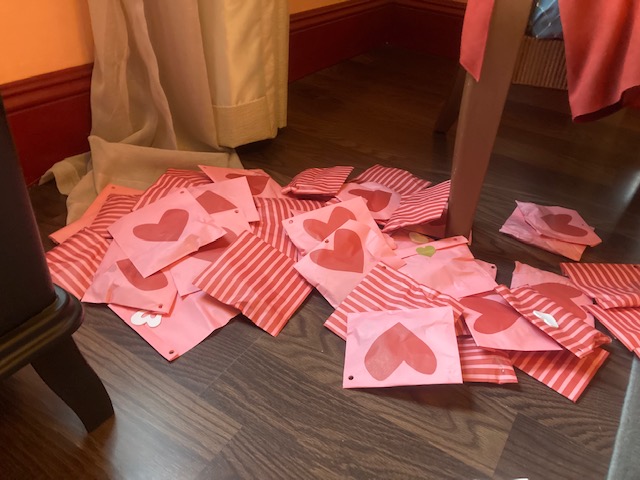I am on a train to Sacramento, making Valentine’s Day cards for state legislators. The cards are handmade, and I’m adorning them with sparkling hearts, personal handwritten love notes, and chocolates. I got a little over-excited at Target, saw all the hearts and glitter, and I went all in, I am even wearing heart-shaped earrings.

Valentine’s Day has always been a mixed bag for me – and probably for a lot of people. But this year, I decided to make hearts for the staff I might meet at the State Capitol – and ask for their support of the Range of Light National Monument.
Who doesn’t love a heart and a little chocolate on Valentine’s Day?
I’ve been working on this tumultuous project about 11 years, and nothing, I mean nothing is guaranteed, no matter how hard I work or carefully I plan… so the very least I can do is make it fun, and making politics fun is a challenge.
But I have flair for drama on the day of hearts.
On Valentine’s Day two decades ago, I left Silicon Valley, and quit my tech job to work as a waitress in Death Valley. I wanted to watch the sun set and rise in a desert canyon, untethered to time, and sip my coffee in the predawn light with my tiny butane flame flickering across a black ocean of sand and rock in the silence of the Mojave.
My boyfriend (at the time) was an anti-Valentine’s-Day-guy. “It’s a Hallmark holiday,” he said, and he said that for three consecutive years and no chocolate was ever delivered. So, I said, “I hope you don’t mind, but I’m going to celebrate in the desert.”
I left him on February 14 at a coffee shop in Cupertino, and drove for nine hours (crying) in the pouring rain. When I arrived in Death Valley, the hottest, driest place on earth, it was flooding, flashing warning signs were everywhere, rivers ran with the gullies, and snow topped the passes. The only radio station I could get was Las Vegas NPR, and they were playing opera. I got out and ran my hand through the cold fluff, delighted, like this was a good omen, freedom and adventure at my fingertips.
Back then, I had $120,000 in savings and a brand-new Tacoma fully equipped, and I was going to do whatever I imagined, and I could imagine a lot.
But as usual, when I imagine that my life is going to pivot in a major way, it’s just a small turn. The desert adventure lasted two months, and no big changes occurred, though I did learn to change a tire in uncomfortable spots on remote roadsides. I busted all four, shredded them on volcanic rocks in those canyons, and destroyed my shocks.
Why did I think it was this big end? Too many Edward Abbey fiction books (*which is all of them) and not enough time outside with reality.
The real end of that journey came 10 years later, when that same truck, now with Colorado license plates, expired registration, no heat, no AC, and only a groaning gurgle coming from the engine, could be seen chugging across the Central Valley headed to the mountains, with me at the helm, wearing wool socks for gloves and two coats to keep warm, and carrying a petition regarding the Range of Light. When you finally get clarity on something of the highest importance, you get started right away. And I did.
I had seen all the places I craved, lived in different cities, climbed mountains in New Zealand and South America, been a ranger and a river guide, danced tango in Argentina, surfed in Costa Rica, and got engaged three times, only to realize that there is one place I love above all others, and it is the glorious Sierra Nevada. I want to spend all my summers wandering among its majestic and outstanding trees, climbing over passes to descend to hidden high alpine lakes, swimming in its emerald pools, sun bathing on granite, letting the warm breeze brush my hair back as the pine needles dance in the sky.
I love those mountains, and my life mission is to express that passion.
So, I have 80 love letters to write and design, candy to carefully attach, with bows, hearts, and a spreadsheet with names and details. It’s 1 a.m. late night project for a several nights, followed by days of entering the very quiet and proper offices of the state legislature – and announcing – not that I have a meeting and a business card – but I have a Valentine.
The smiles made it absolutely worth the effort.
We humans are supremely smart and creative. We can imagine, plan, and build entire worlds in our minds, each one of us. We are the most powerful creatures on this planet, and all around us is beauty: the sound and shape of ocean waves, the complexity and intricacy of a single feather on a bluebird soaring through the sky, the wonder and mystery of the bright stars twinkling in the heavens. It’s all right there in front us, reminding us of how special it is to be alive.
We just can’t see it. We’ve lost our sight.
Saint Valentine’s Day comes with a lot of legends, but according to respected lore, to win back his freedom, an imprisoned saint blessed his jailer’s daughter and gave her back her sight, and he signed a letter to her, “from your Valentine.” Another legend states that the saint defied the emperor’s orders and secretly married couples to spare the husbands from being conscripted to serve in war.
In any case, it’s about love.
Happy Valentine’s Day – Belated.


